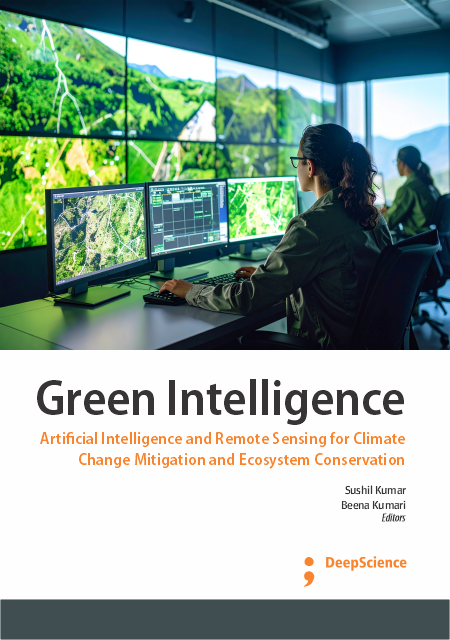Green Intelligence: Artificial Intelligence and Remote Sensing for Climate Change Mitigation and Ecosystem Conservation
Keywords:
Artificial Intelligence, Remote Sensing, Climate Change, Renewable Energy, Deep Learning, Sustainable DevelopmentSynopsis
Currently, straddling what many refer to as the human-influenced epoch of "the Anthropocene" we are in a unique place where two paths are advanced. The first is a way toward transitioning to an under-explored territory of ecological decline where biodiversity vanishes, such cataclysmic weather events leave cities uninhabitable and our food system has morphed into untenable distribution chains. On the other is a once-in-a-generation chance at transformation, using artificial intelligence (AI) not to simply lessen ecological damage but to regenerate and re-envision our kinship with earth.
Yet it seemed critical that an immediate response be provided, which is why we offer this book Green Intelligence: Artificial Intelligence and Remote Sensing for Climate Change Mitigation and Ecosystem Conservation. It compiles new discoveries, analytic frameworks and models for understanding, thinking about, organising and deploying AI to help accelerate the emergence of planetary intelligence and enable the application of prudential judgement in navigating this next geologic epoch. Sustainable, or what we can Call Green Intelligence as DfMA is not simply the next generation of High-Tech interventions. This is about developing technologies that resonate with natural rhythms, which are vigilant, adaptive, and look ahead instead of backwards.
Organized into thirteen interdisciplinary chapters, the book explores how AI and its subfields have evolved to tackle a growing list of environmental challenges; from The Rise of Green Intelligence where Earth observation data by geospatial technologies together with artificial intelligence algorithms are utilized in unlocking secrets hidden within complex earth and planetary systems, thereby holding potential promise for enhancing sustainability on-the-ground, to applied chapters on real-world applications on remote sensing, biodiversity conservation, smart agriculture, urban sustainability and climate forecasting. We delve into the frontlines of AI-powered cities (Urban Ecosystems and AI-Driven Cities), and reflect on the promise and pitfalls of integrating Indigenous knowledge systems (Indigenous Knowledge Meets Artificial Intelligence) and citizen science initiatives into AI ecosystems.
At its core, this book also confronts vital questions: Can AI truly align with ecological ethics? What are the risks of algorithmic biases in environmental contexts? How do we ensure AI systems remain accountable, inclusive, and regenerative?
Green Intelligence is written for a diverse readership scientist, environmentalists, data practitioners, educators, policymakers, and students who are seeking not only answers but also inspiration. It aims to foster an informed dialogue at the intersection of technology, ecology, and society.
The final chapters imagine the road ahead: from designing symbiotic AI technologies that work with, rather than against, nature, to building frameworks for governance and policy in the green tech revolution. The concluding vision Towards a Regenerative Intelligence calls for a future in which artificial intelligence serves not as a tool of domination, but as a companion in the co-evolution of sustainable and just ecosystems.
We hope this book is a stepping-stone to inspire deeper exploration, collaboration and ethical innovation for life on earth.
References
Al Mamun, M. A., Hannan, M. A., Hussain, A., Basri, H., & Yusof, Y. (2021). A review on smart solid waste management systems using IoT and machine learning: Challenges and future directions. Journal of Cleaner Production, 277, 123318. https://doi.org/10.1016/j.jclepro.2020.123318
Amin, M., & Wollenberg, B. F. (2005). Toward a smart grid: Power delivery for the 21st century. IEEE Power and Energy Magazine, 3(5), 34–41. https://doi.org/10.1109/MPAE.2005.1507024
Amini, A., Kung, E., Lin, Z., & Liu, S. (2019). AI-based real-time traffic prediction systems: A case study of urban sustainability. Transportation Research Part C: Emerging Technologies, 106, 381–397. https://doi.org/10.1016/j.trc.2019.07.010
Batty, M., Axhausen, K. W., Giannotti, F., Pozdnoukhov, A., Bazzani, A., Wachowicz, M., ... & Portugali, Y. (2012). Smart cities of the future. The European Physical Journal Special Topics, 214(1), 481–518. https://doi.org/10.1140/epjst/e2012-01703-3
Bawa, A. S. et al. (2019). Precision Agriculture for Sustainability and Environmental Protection. CRC Press.
Bechar, A., & Vigneault, C. (2016). Agricultural robots for field operations: Current status and future trends. Biosystems Engineering, 149, 94–111. https://doi.org/10.1016/j.biosystemseng.2016.06.001
Biber-Freudenberger, L., et al. (2016). The role of citizen science in sustainable development. Sustainability Science, 11(3), 327–343.
Celik, K., Jasiūnas, J., Bevins, R., & Quintero, M. (2018). Real-time carbon tracking with IoT-based sensor networks. Sensors and Actuators B: Chemical, 255, 1077–1085. https://doi.org/10.1016/j.snb.2017.08.099
Cheng, X., Chen, D., Li, J., & Wang, Z. (2021). Artificial intelligence and environmental sustainability: A review and application framework. Sustainable Computing: Informatics and Systems, 30, 100512. https://doi.org/10.1016/j.suscom.2021.100512
Colombo, A. F., Lee, J., & Karney, B. W. (2009). A selective literature review of transient-based leak detection methods. Journal of Hydro-environment Research, 2(4), 212–227. https://doi.org/10.1016/j.jher.2009.02.003
Crawford, K., & Joler, V. (2018). Anatomy of an AI System. SHARE Lab & The AI Now Institute. https://anatomyof.ai
Crutzen, P. J. (2006). The "Anthropocene". In E. Ehlers & T. Krafft (Eds.), Earth system science in the anthropocene (pp. 13–18). Springer. https://doi.org/10.1007/3-540-26590-2_3
Delmas, M. A., & Burbano, V. C. (2011). The drivers of greenwashing. California Management Review, 54(1), 64–87. https://doi.org/10.1525/cmr.2011.54.1.64
Dubey, R., Gunasekaran, A., & Childe, S. J. (2020). Big Data and Predictive Analytics in Supply Chain Sustainability. Springer.













